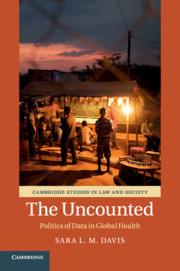Book contents
- The Uncounted
- Cambridge Studies in Law and Society
- The Uncounted
- Copyright page
- Contents
- Figures
- Tables
- Abbreviations and Terms
- Chapter 1 Contested Indicators
- Chapter 2 The Uncounted: Key Populations
- Chapter 3 “Something More than Data”
- Chapter 4 Cost-Effectiveness and Human Rights
- Chapter 5 Modeling the End of AIDS
- Chapter 6 Sustainability, Transition, and Crisis
- Chapter 7 Listening to Women
- Chapter 8 “So Many Hurdles Just to Leave the House”
- Chapter 9 The Panopticon and the Potemkin
- Chapter 10 Data from the Ground Up
- Reflection Questions
- Acknowledgments
- References
- Index
- Cambridge Studies in Law and Society
Chapter 3 - “Something More than Data”
Published online by Cambridge University Press: 18 May 2020
- The Uncounted
- Cambridge Studies in Law and Society
- The Uncounted
- Copyright page
- Contents
- Figures
- Tables
- Abbreviations and Terms
- Chapter 1 Contested Indicators
- Chapter 2 The Uncounted: Key Populations
- Chapter 3 “Something More than Data”
- Chapter 4 Cost-Effectiveness and Human Rights
- Chapter 5 Modeling the End of AIDS
- Chapter 6 Sustainability, Transition, and Crisis
- Chapter 7 Listening to Women
- Chapter 8 “So Many Hurdles Just to Leave the House”
- Chapter 9 The Panopticon and the Potemkin
- Chapter 10 Data from the Ground Up
- Reflection Questions
- Acknowledgments
- References
- Index
- Cambridge Studies in Law and Society
Summary
To understand how community leadership can be incorporated in health research, this chapter tracks the first stages of a population size estimate in six Eastern Caribbean countries, with a focus on one of the countries, Grenada. Grenada is a small island state and an upper-middle-income country. While external aid previously funded much of the region’s HIV response, global health agencies are transitioning out to prioritize reaching the “end of AIDS” in high-prevalence, lower-income countries. However, criminalization and discrimination contribute to lack of resources for key populations in middle-income countries. In Grenada, abrupt US aid withdrawal left community groups dormant, without funding or staffing. In past studies, after the data was extracted, local groups saw no results of the research. A regional civil society group, Caribbean Vulnerable Communities (CVC), will lead this new population size estimation study. An ethnographic study of the CVC study highlights the challenges with finding and counting hidden key populations. CVC must restart old networks and rebuild trust. The activists negotiate for power and control of the data, using their arduous research to position revived community groups at the center of national HIV responses; hoping that the research will produce “something more than just data”.
Keywords
- Type
- Chapter
- Information
- The UncountedPolitics of Data in Global Health, pp. 65 - 93Publisher: Cambridge University PressPrint publication year: 2020



